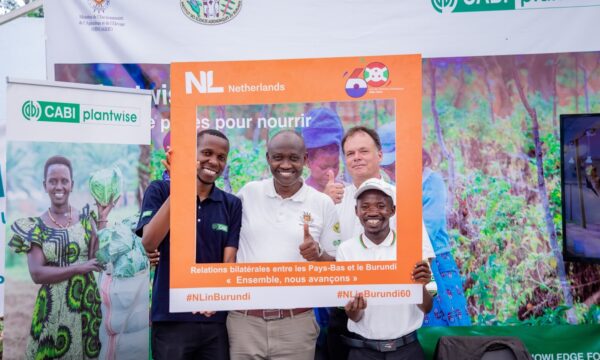
Dr Kuhlmann speaking at the GLAST event
At a meeting of the world’s top agricultural scientists in China, CABI’s Executive Director for Global Operations, Dr Ulrich Kuhlmann, stressed the key role rural advisory services play in lifting agricultural communities out of poverty. As he pointed out, “Some of the most relevant and appropriate information isn’t high tech or innovative, but that doesn’t mean farmers know about it.”
The Global Forum of Leaders for Agricultural Science and Technology (GLAST) was founded in 2006 by Chinese Academy of Agricultural Sciences (CAAS) with FAO and CGIAR as co-sponsors. This year’s meeting, which took place from 13-15 December in Lingshui, China, focussed on the theme of ‘Eliminating Hunger and Poverty through Science and Technology Innovation.’ The four previous GLAST meetings have demonstrated the forum’s effectiveness in sharing information and experiences, as well as promoting partnerships among national agricultural research institutions and international organizations.

Panel speakers (left to right): Robert Habib (INRA), Hans R. Herren (Millennium Institute), Benjamin Davies (FAO), Ulrich Kuhlmann (CABI) and Zhou Guanghong (Nanjing Agricultural University)
Dr Kuhlmann explained that in many developing countries, national agricultural extension systems are the primary technique for putting information, skills, and tools into farmers’ hands. However, these extension systems often suffer from understaffing, limited funds, and weak links to relevant partners. For example, in Kenya each individual extension worker has to serve 950 farmers on average; in Uganda 2,500 farmers; and in Nigeria 3,420 farmers.
While there is no ‘one-size fits all’ solution, Dr Kuhlmann suggested that by improving links to other agricultural stakeholders such as research institutes, regulatory bodies and the private sector, making better use of data and ICT solutions, and improving performance assessment, countries are able to make their services more effective for the end-users – the farmers themselves. The local context is crucial: only by understanding the specific needs of farmers in developing countries, and by building the capacity of extension systems to help them to adopt new technologies, can these challenges be addressed.
CABI’s own Plantwise programme is an attempt to support developing countries’ efforts in this area. By training extension officers to become plant doctors, farmers get better crop management advice at the point of contact. In turn, plant doctors are empowered by our ICT innovations, such as the Knowledge Bank, and the factsheet, data collection and messaging apps available on tablets. Working within national frameworks, we help build the linkages between relevant stakeholders by bringing them together in national steering committees. This has already led to improved yields for farmers; and more joined-up and quicker national responses to crop pest outbreaks.
See the GLAST website for information about the event: http://glast.caas.cn/
Related News & Blogs
How plant clinics are strengthening crop health services in Bangladesh
When the first-ever plant clinic in Bangladesh opened in Dhaka in 2013, it initially faced a lack of interest due to its novelty and limited awareness among farmers. However, it went on to expand, providing advice to over 17,000 farmers and led to the…
2 July 2025




